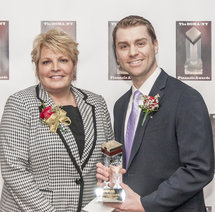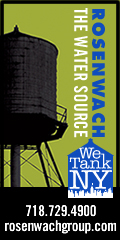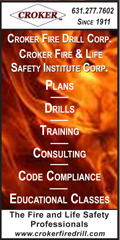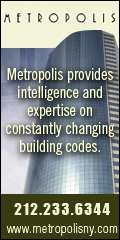 |
April 2014
 |
Total Teamwork, Respect and Communications: A Conversation with Pinnacle Winner Brian Jauntig
Intro
As a college junior, Brian Jauntig had the good fortune to be introduced to a "fresh, new experience"—prominent industry professional John McGinley, then at 30 Rockefeller Plaza, had recommended him for a summer internship at Tishman Speyer’s 375 Hudson Street. From his first day on the job, Brian was hooked.
A decade later, he is the 2013-14 Pinnacle Award Manager of the Year (3-10 Years of Experience), and has just taken over the helm of the Monday Properties’ multiple award-winning 230 Park Avenue. BOMAFACTS spoke with Brian shortly after his win to learn his thoughts on the profession and more.
Q: You've said you took to the profession instantly, but what attracted you?
A: I loved the big city feel, the first-class teamwork. I was 20 years old and had never worked in the city before, but from day one, I appreciated the fact that the job revolved around communication with intelligent individuals. Staff, consultants, my colleagues throughout the company—who were fantastic—tenants... everyone contributed in an informed and helpful way. I was part of something where I could learn, gain experience and contribute. I liked the constant feel of working as a team all day long. I know some do better working individually, but no matter what your approach, the most important thing, I believe, is the environment created by people working towards the same goal. I saw the team thriving and wanted to be part of a work environment like that. Q. Has that changed at all for you now that you are managing your own property? A. Teamwork and communication have become even more important to me as a manager. In our profession, urgency absolutely exists. Our team at 230 Park meets regularly on long-term projects and planning, but we always take the time to speak every day about the unanticipated agenda items. Those unexpected items can also be a force for building and enhancing teamwork. And we take teamwork a step further at 230, as the building is a major part of Midtown and the Grand Central landscape. If we, as a property look good, we’re adding value to this community. Q. Many cite the daily variety of tasks as one the field’s most engaging aspects. Your thoughts?
A. Variety is certainly an attraction, but more importantly for me, it’s the capabilities of the variety of people you work and learn with. At the manager level in a corporation, you work with contemporaries at your own level within a division. As a property manager, you work with some of the most accomplished in their fields—the design engineers, architects, consultants on all levels, and the successful industry leaders we are happy to call our tenants. Q. Switching topics, how have the RPA and LEED AP aided you? A. The LEED AP accreditation prepared me to speak intelligently about the process when my former building, 1440 Broadway, was going through the process to achieve LEED Gold. I knew the subject matter and was therefore able to communicate it effectively to tenants. You can only control so much of the efficiency of your property without tenant participation. Communications is crucial—you can’t be successful in persuading anyone to change particular habits and work in a more efficient manner if you don’t have confidence in your own knowledge of the subject matter. The RPA drills down on everyday material in depth. BOMI structures the classes using real life case studies. You have definitions and break-outs of industry terms, but the case studies tie what you’re learning into everyday work situations; they’re extremely helpful. Q. What’s the biggest challenge facing managers today? A. The need to be constantly flexible in the services provided and everything that impacts a building, including areas that may not have been traditionally allocated to management. It’s not necessarily just a result of tenants or the market becoming more sophisticated, it’s based on the rapid pace at which all business evolve today. We have to observe and understand how we can incorporate changes in the marketplace, advances in resources and technology, and aesthetics into our building community. It’s important to stay ahead of the trend and then determine what you can do to retain the higher-end users. Q. How do you get that information? A. Through contact with colleagues or groups such as BOMA/NY, REBNY and NAIOP (Brian is now president-elect). Our building team also tries to look beyond our own resources. For example, the tenant survey scores are always important, but we like to focus on the tenant "wish lists" as well. We will not disregard any suggestion as to how we can better our services, or deem suggestions as impossible or too costly. We’ll determine what is feasible, and be as flexible as possible.  Q. You've achieved a lot in just nine years. What do you want to master in the future? Q. You've achieved a lot in just nine years. What do you want to master in the future?A. I've been fortunate enough to make important friends and contacts within the industry. My plan is to challenge myself through education and experience to better prepare, to always make a positive impact. There’s so much talent in the New York real estate industry. It’s a pleasure leaning from those who know best in order to sharpen my own skills. Q. Any additional advice to those who might seek a career in property management? A. Sure. Ours is a very tight industry. Make the most out of every relationship you develop. Definitely accept that there is always a starting point—and don’t see yourself above that point. Be respectful. The more you respect the opportunities you’re given, the more you will grow and thrive. Q. How do you see the next generation of leadership shaping up? A. I frequently meet colleagues that are extremely motivated to do well and have respect for what was laid out for them. It seems that motivation is contagious among my generation. When someone sees you doing well and working hard—they’ll be motivated to do the same. That speaks volumes about where we’re headed. |
| BOMA/NY Suite 2201 Eleven Penn Plaza, New York, NY 10001 Ph: 212-239-3662 Fax: 212-268-7441 www.bomany.org |
 |




